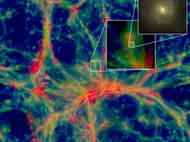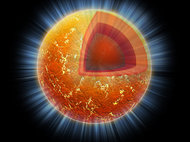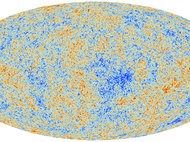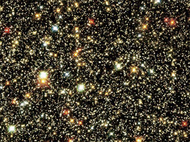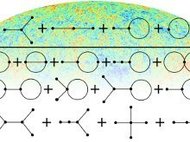Research Fields at MPA
The MPA is the major German institution dedicated to theoretical and interpretational research in astrophysics and cosmology. Areas of interest include stellar astrophysics, computational astrophysics and cosmology, the structure, evolution and clustering of galaxies, cosmic large-scale structure, gravitational lensing, microwave background studies and physical cosmology. Because of the close cooperation of the various groups and the fact that often the different areas overlap, there is no strict distinction between the individual areas of research at the Institute.
Further information may be found below and by following the links in the menu on the left.
Large-scale computer simulations are the primary research tool for understanding how the complex structure of the universe emerged from the remarkably simple initial conditions seen in microwave background maps. MPA scientists are active in all aspects of such simulations, developing the numerical codes, deploying them on the largest available supercomputers, and using the results to interpret observational data on galaxies, galaxy clusters and the large-scale structure.
more
Research in galaxy formation at MPA uses a variety of theoretical techniques, ranging from direct numerical simulations to analytic and semi-analytic modelling. In addition, we are involved in the detailed analysis of large observational surveys. Millennium Simulations Semi-analytic Modelling Hydrodynamical Simulations The Sloan Digital Sky Survey´
more
High Energy Astrophysics research deals largely with the interaction of matter with radiation under extreme physical conditions.
more
Research on physical cosmology at MPA tries to understand the physics responsible for the accelerated expansion of our Universe, both at early and late times, using state-of-the-art data and laws of physics.
more
Stellar Astrophysics is concerned with stellar evolution theory, i.e. with the theoretical modeling of the life and death of single stars (e.g., our Sun) and binary stars. In this context, methods of numerical hydrodynamics are applied to develop computer models for explosions of stars, for collisions between binary stars, for simulating the relativistic gas outflow (jets) from black holes, and for studying convection and turbulent flows in stellar plasmas.
more
Information field theory (IFT) is information theory, the logic of reasoning under uncertainty, applied to fields. A field can be any quantity defined over some space, e.g. the air temperature over Europe, the magnetic field strength in the Milky Way, or the matter density in the Universe. IFT describes how data and knowledge can be used to infer field properties and can be used for signal processing and image reconstruction.
more

